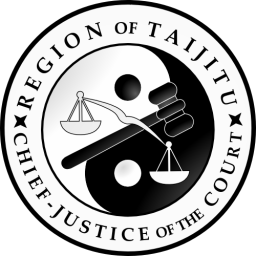Chief Justice of the Court
| Chief Justice of the Court | |
|---|---|
| History | |
| Formation | Constitution of Taijitu June 20, 2010 |
| Inaugural holder | Gulliver July 25, 2010 |
| Incumbent | Zoe
|
| Appointment | |
| Selection | Delegate nomination with Senate confirmation |
| Term length | Fourteen weeks, unlimited renewable |
| Office | |
| Office of the Chief Justice | |
The Chief Justice of the Court is the head of the judicial branch of Taijitu's government. The Constitution charges them with administering the business of the Court of Taijitu and enforcing established procedures for trials. This includes important responsibilities such as deciding which cases to try and determining the admissibility of evidence. Like other justices, they are appointed by the nomination of the Delegate and the confirmation of the Senate by a two-thirds majority vote, and serve for a term of fourteen weeks unless removed early by another two-thirds majority vote of the Senate. The current Chief Justice is Zoe
, appointed on June 1, 2012
.
Contents
[hide]History
The office of Chief Justice is a relatively new one, and did not exist under previous constitutions. Though there was a Supreme Court tasked with trying criminal cases, no distinction between a Chief Justice responsible for enforcing procedure and lay associate justices was made. Instead the Supreme Court was managed by consensus among its several justices. When a constitutional convention was convened in May of 2010, it was decided that this lack of any clear leadership was potentially problematic and undesirable. As a result, a new constitution ratified on June 20, 2010 created the office of Chief Justice to resolve this issue.
Powers
The Chief Justice's responsibilities are related to conducting trials. Under the Constitution, the Chief Justice is charged with administering the business of the Court according to whatever procedures may be established by law. In cases where no procedure exists, they are allowed to use their own judgement.
The Due Process Act which defines such procedures grants the Chief Justice numerous powers. They are responsible for deciding if enough evidence exists to continue to detain a suspect, and picking which cases merit a trial. They determine which evidence is admissible and may dismiss attorneys who behave inappropriately. When a decision is reached, they are responsible for authoring a statement which summarizes the Court's reasoning.
The Chief Justice also plays an important role in during elections and referendums. As the Court is responsible for administering such public votes, the Chief Justice, as the body's leader, is expected to ensure that this duty of the Court is also properly carried out.
Appointment and removal
The Chief Justice is appointed in the same any other justice of the Court is. The Delegate nominates a candidate, which the Senate may then approve by a two-thirds majority vote. Likewise, the Chief Justice also serves a fourteen week term, and may be removed early by another two-thirds majority vote of the Senate. As an unelected office, they may not be recalled.
See also
| Government of Taijitu | |||||
|---|---|---|---|---|---|
| Legislative | Ecclesia · Citizen-Initiator | Executive | Delegate · Citizen-Diplomats · Citizen-Liaison · Armed Forces . Citizen-Sergeant | Constitution | Constitution |
| Laws | Alliance Between Taijitu and The North Pacific . Citizen-Initiator Act .Citizen-Liaison Act. Citizenship Act . Delegacy Act . Flag and Seals Act · Holidays Act . Judiciary Act . Militia Act . Noble Houses Act . Revolutionary Calendar Act . The Rejected Realms - Taijitu Treaty of Friendship and Cooperation . University of the Revolution Act | ||||
